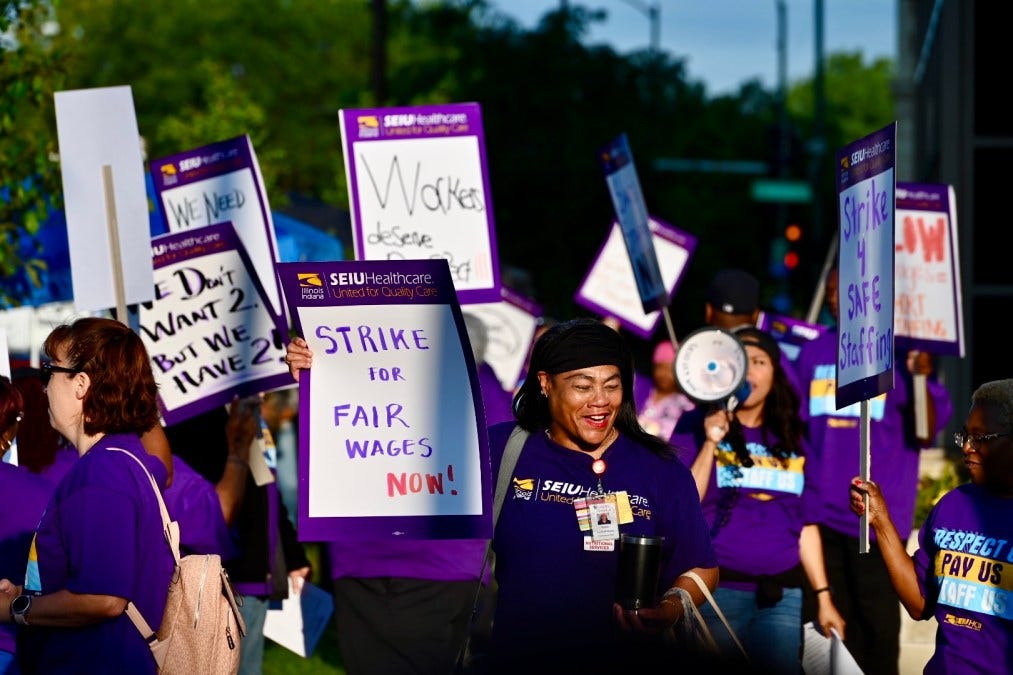Sept. 5, 2023 ❧ Overtime pay, war with Mexico, and a mess at Burning Man...
Plus a Chicago hospital strike, crackdowns on out-of-state abortions, Bolsonaro's legal woes, Israel's African migrants, and more...
There’s plenty of news from around the world, and we will get to it shortly, but the most important news from here in downtown New Orleans is that the latest edition of the Current Affairs print magazine has just been released! It’s full of in-depth essays on fascinating topics (this time around: Soviet cinema, Anthony Bourdain, fascism, death, and more) plus beautiful original artwork and bitingly satirical fake ads. Paid briefing subscribers can get $20 off by clicking the link at the end of this page. We’ve worked hard on this, our 43rd edition, and we can’t wait for you to read and enjoy it.
Alright, and with that out of the way, on to your regularly scheduled News Briefing….
Remember: email briefing@currentaffairs.org with letters to the editor, queries, and suggestions for news stories!
STORIES THAT SHOULD BE BIGGER
OVERTIME PAY EXTENDED TO MILLIONS OF U.S. WORKERS
In a significant reform to the country’s wage system, the Department of Labor has announced a proposed overhaul of the federal rules and regulations around overtime pay. Under the current system, workers who earn more than $35,568 a year are not eligible for extra pay, no matter how many hours they work over 40 in a given week. As the nonprofit publication Capital and Main has reported, this means that the number of workers who actually receive overtime has “shriveled from 60% in 1975 to a nadir of 7% in 2016.” In 2022, the figure stood at just 15 percent. Under the Department’s new rules, however, the overtime exemption threshold would increase to $55,000, making an estimated 3.6 million people eligible for the first time. In a press release, acting Secretary of Labor Julie Su framed the rulemaking as an affirmation of “the promise that you get to go home after 40 hours, or you get higher pay for each extra hour that you spend laboring away from your loved ones,” which she calls “a cornerstone of workers’ rights in this country.” Unlike previous adjustments, the new policy also includes automatic yearly increases, which will allow workers’ pay to keep pace with inflation and rises in the cost of living over time. Experts have warned that a legal challenge from employers is likely, and in 2016, the Obama administration failed to raise the overtime threshold from $23,660 to $47,476 after a federal judge in Texas ruled against the move. It remains to be seen if the Biden-Harris government will fare better. Still, if the measures go through, they would make a life-changing difference to millions, as the American Prospect notes:
“Once this rule goes into effect, some workers will get paid more money for the extra time they put in on the job, some workers will get their time back and be better able to balance their work and personal lives, and some workers will get new jobs or extra hours as work is spread out among more people,” said Judy Conti, government affairs director of the National Employment Law Project. “All of these things are great results.”
HOUSE RESOLUTION INTRODUCED TO PREVENT INVASION OF MEXICO
It has become an increasingly common Republican policy position that the United States should invade Mexico to fight its drug cartels which have played a significant role in fueling America’s fentanyl crisis. Representatives Dan Crenshaw (R-TX) and Mike Waltz (R-FL), along with 19 other Republicans introduced an Authorization for the Use of Military Force to send “special forces,” to the country to “put us at war with the cartels.” Senator Tom Cotton (R-AR) has said that he’d be willing to send U.S. troops even without Mexico’s permission while Senator Lindsey Graham said it was time to unleash the “fury and might of the United States.” Mexico’s president, Andrés Manuel López Obrador has come out against a U.S. invasion, calling it “irresponsible” and “an offense to the people of Mexico.”
As many pundits made the laughable assertion that the Republican Party had become an “anti-war” party, putting boots on the ground in Mexico—or even launching bombing raids, drone strikes, and cyber warfare—has become a mainstream position for most of the party’s major presidential candidates. Donald Trump has said he wishes he’d launched a war with Mexico during his presidency and has asked military advisers for “battle plans.” According to a memoir by his former Defense Secretary Mark Esper, Trump once said “We could just shoot some Patriot missiles and take out the labs, quietly…No one would know it was us.” Ron DeSantis, Nikki Haley, and Vivek Ramaswamy have also endorsed some sort of U.S. military operation in Mexico.
In response to the Republicans’ beating of war drums, a group of progressive Democrats, led by Democratic Representatives Jesús “Chuy” García (D-IL), Joaquin Castro (D-TX), and Nydia Velázquez (D-NY) introduced an amendment to the 2024 Defense Appropriations Bill that would use the 1973 War Powers Resolution to bar the president from using any portion of the military budget in hostilities with Mexico. When the Intercept contacted 18 House Republicans who have previously supported War Powers resolutions to pull back U.S. troops in other conflicts, most did not respond. Even Matt Gaetz—who has aligned with progressives on some foreign issues like opposing the sale of cluster munitions to Ukraine and fashions himself an opponent of “endless wars”—said he supported military force against Mexico.
The issue of fentanyl trafficking is genuinely serious and needs to be addressed—nearly 71,000 Americans died of synthetic opioid overdoses (mostly fentanyl) in 2021 alone. But this is in spite of aggressive drug war policies within both the U.S. and Mexico. A war is likely to increase the chaos that contributes to the success of cartels in the first place. As Ilya Somin, a Professor of Law at George Mason University writes in the libertarian Reason magazine, a potential U.S. invasion could have numerous horrid consequences and builds on policies that have failed us for decades:
The present decades-long War on Drugs is already a horrific disaster. It kills and imprisons large numbers of people in both the US and abroad, while stimulating organized crime, and doing little to curb harmful addiction…The current fentanyl crisis—used as a justification for attacking Mexico and other drastic measures—is itself largely a result of the War on Drugs, a predictable consequence of the “Iron Law”of prohibition, under which banning markets incentivizes dealers and users to turn to harder, more potent drugs. It's unlikely that attacking Mexico will do much to curb drug addiction in the US. Most fentanyl smuggling is conducted by US citizens crossing legal ports of entry, not undocumented immigrants or Mexican cartel operatives. If military intervention succeeds in killing or disrupting some Mexican suppliers, others (including others from other countries) are likely to take their place, so long as there is still a demand for the product. That has been the result of past attempts to interdict drug supplies from Colombia, Afghanistan, and elsewhere. At most, we might get a modest temporary reduction in drug use…
Obviously, it is almost unavoidable that innocent civilians will be killed or injured in the fighting, especially since drug traffickers are hard to distinguish from the rest of the population. There are likely to be casualties among US troops, as well. The 1.6 million Americans living in Mexico could potentially become targets for terrorism or retaliation by drug cartels. Here in the US, we could see racist and vigilante violence against Mexican-Americans. At the very least, a conflict with Mexico would predictably inflame racial and ethnic tensions. Mexico recently became America's largest trading partner. A military intervention would likely disrupt that relationship, seriously damaging both nations' economies.

BIG STORY
AFTER PRESCIENT CLIMATE PROTESTS, UNPRECEDENTED DESERT RAINS TURN BURNING MAN INTO A SLOPPY MESS
The Burning Man music festival, held each year in a remote part of the Nevada desert, hit a bit of a snag this weekend. The more than 70,000 attendees who flocked to the makeshift city became stranded for days as the area was hit with a torrential rainstorm which turned the site into a muddy hellhole and exit roads became blocked. Festival goers were made to shelter in place and conserve food, fuel, and water, while porta-potties overflowed due to an inability of sanitation trucks to service them. Rumors abounded of an Ebola outbreak, though this appears to be false. But many attendees suffered horrific bouts of “trench foot” after spending days in wet mud. A few intrepid souls hiked more than six miles through the Nevada desert rather than stick it out in the mudhole. Meanwhile, at least one death is reported at the festival—the cause of which is under investigation, but organizers say it was unrelated to the weather.
After burning the titular “Man”—a giant wooden effigy—to conclude the festival on Monday, attendees began to make their exodus from the site on schedule after roads were finally cleared.
The flash flood that turned Burning Man into a mud pit is unprecedented for the area. The Black Rock Desert was hit with more rain within a single 24-hour period than it usually gets over two to three months. It’s the latest natural disaster in a year that has seen more severe weather worldwide amid global temperatures that are the hottest ever recorded.
In a display that feels oddly symbolic and prescient with hindsight, the planned site of Burning Man became the subject of climate protests last week. As the popup town that would host the festival was being constructed— a small group of climate activists, which included Extinction Rebellion and Rave Revolution parked a 28-foot trailer across the road, causing miles of gridlock. They pointed out that Burning Man, which claims an earthy, countercultural ethos, is actually quite horrendous for the environment. Each year, festival-goers leave behind mounds of trash for locals to clean up. The event requires fleets of thousands of vehicles to travel miles through remote desert, not just to transport festival goers themselves, but also all the resources needed to sustain them through more than a week of isolation from society. The event involves setting numerous wooden structures ablaze, which pumps carbon dioxide into the atmosphere. And many attendees, often from an elite Silicon Valley milieu, travel to the event on private jets. Burning Man’s own estimates say that the event produces 100,000 tons of carbon dioxide—about the equivalent of 22,000 gas-powered cars.
The protesters who descended upon the festival’s planned site demanded that Burning Man—which claims “leaving no trace” on the environment, “civic responsibility,” and “decommodification” as core principles—actually live up to them by reducing its carbon footprint, including “banning private jets, single-use plastics, unnecessary propane burning, and unlimited generator use.” Police were instead called in to violently disperse the peaceful protesters so the construction of the site could continue unabated. One police car barreled through a barricade and then shouted over a loudspeaker, “I’m going to take all of you out, you better move!” He and other rangers then began to arrest protesters at gunpoint and left one with a bleeding head.
The subsequent descent of Burning Man into a flooded, muddy cesspool feels like some kind of karmic retribution from the universe. Among the people who got trapped was Neal Katyal—a lawyer who’d previously argued for Nestle’s right to profit from child slave labor before the Supreme Court. Another was Grover Norquist, the leader of the Koch-funded global warming-denying think tank Americans for Tax Reform, which dismisses climate activists as “do-gooder greenies.”
If not karma, then it should at least be heeded as a warning that something is amiss. It’s exactly the sort of catastrophe that the climate movement has incessantly warned will become more common if the crisis is not addressed (and has, sadly, been proven right about over and over throughout the last fifty years, which have seen a fivefold increase in natural disasters globally). It is very easy to make vague commitments to sustainability, as Burning Man does, but few are actually able to risk what these climate activists were in an effort to force concrete change. The activists who went to Nevada were willing to endure arrests and bodily injury to fight the danger we know is coming. This is one of the many ways—large and small—that regular people can take climate action.

AROUND THE STATES
In Chicago, staff at Loretto Hospital have won a new employment contract after an 11-day strike. The facility is one of the city’s “safety net” hospitals, which primarily treat underinsured patients or those with no insurance at all. For years, it’s had systemic issues with low pay and understaffing, with some workers making as little as $17 an hour, and investigative reporting by WBEZ revealed that “multiple patients have died or come dangerously close to dying at Loretto specifically because of short staffing.” On July 31st, around 200 nursing assistants, technicians, and janitors declared a work stoppage, and on August 10th they ratified a new contract increasing minimum pay to $19, with an average 14.5 percent pay increase across the next three years. This, they hope, will prevent staff from “leaving because of the pay,” and allow them to better serve the local community.

A town in central Texas just gave us a glimpse into what may be the next legal frontier for anti-abortion activists. The town of Llano is attempting to use “trafficking” laws to make it illegal for people to travel on certain roads within their jurisdiction en route to obtain an abortion out of state. Abortion is almost totally banned in Texas, but this law may serve as a test of whether states can attempt to criminalize those who attempt to flee to other states as well. Alabama (which is considering a law charging women who have abortions with murder) is also trying something similar—its attorney general just argued in court that he has the right to file criminal charges against people who engage in the “criminal conspiracy” of helping women obtain abortions in other states. Idaho also passed a law earlier this year making it punishable by two to five years to help a pregnant minor cross state lines to get an abortion. The legality of these restrictions is largely untested, but there is a good chance they could run afoul of the Constitution’s Commerce Clause (Article I, Sec. 8, Clause 3) which gives Congress the enumerated power “to regulate Commerce…among the several states.”
LONG READ: In our last briefing, we discussed how Medicare will soon begin to negotiate drug prices, which are more than twice as high in America than in other peer countries, with private pharmaceutical companies. We only provided a cursory discussion of how prices got so ludicrously high in the first place. In Jacobin, Andrew Perez and Matthew Cunningham-Cook discuss how our private healthcare system enabled the pharma industry to massively overcharge Americans:
In some cases, Americans — whose tax money subsidizes the development of virtually all medicines approved for sale in the United States — are being charged 1,000 percent more than foreign patients for the same drugs. For two decades, the US government barred Medicare from negotiating drug prices. At the same time, drug companies have gamed the patent system to prevent competitors from selling lower-cost generic versions of their products. Meanwhile, for decades drugmakers’ congressional allies blocked legislation designed to help pharmacists and wholesalers import medicines at lower world-market prices and sell them at discounted rates in the United States.
A LABOR DAY TRIVIA QUESTION
(From Jon Schwarz in The Intercept)
Which U.S. vice president said this, and when?
“The time is not far distant when the working man can have a four-day week and family life will be even more fully enjoyed by every American. [These are] not dreams or idle boasts, simply projections of the gains we have made in the past four years.”
ANSWER: RICHARD NIXON, when he and Dwight Eisenhower were running for reelection in 1956.
Dwight D. Eisenhower (left) and Richard M. Nixon after being renominated at the 1956 Republican National Convention in San Francisco. IMAGE: Dwight D. Eisenhower Library/U.S. Army, via Encyclopedia Britannica
Schwarz writes, “The fact that Nixon — generally not seen as a left-wing radical — was calling for a 32-hour workweek by 1956 illustrates how deeply it had seeped into American consciousness that, over time, everyone would get to work less and live more. The general concept is simple, even if its manifestation is complex.”
We now take the five-day, eight-hour work week for granted, but it, too, was the product of a decades-long struggle by labor activists. At the time, it was treated as a pipe dream and met with furious resistance from employers and repression from the state. According to Schwarz,
“In the second half of the 1800s, new industrial employers regularly required 60 hours or more of work each week. On May 1, 1867, unions demonstrated in Chicago in support of a new Illinois law that mandated an eight-hour workday. This didn’t go anywhere: Employers largely ignored both the demonstrators and the law. But in memory of the 1867 protests, a nationwide labor federation picked May 1, 1886, as the day for a universal strike calling for an eight-hour day. This was such a heartfelt desire that demonstrators sang a song called ‘Eight Hours:’
“We want to feel the sunshine.
And we want to smell the flow’rs.
We are sure that God has willed it
And we mean to have eight hours.
Eight hours for work, eight hours for rest,
Eight hours for what we will.”
“The millionaires of the Gilded Age found this so charming,” Schwarz writes, “that Chicago police shot and killed several striking workers at the city’s McCormick reaper plant. The next day, a striker threw a bomb at the cops, killing one of them. All of this became known as the Haymarket Affair, one of the most significant events in U.S. labor history.”
By 1940, an eight-hour workday—treated as radical and utopian in its day—would be enshrined in the Fair Labor Standards Act. But despite a more than threefold increase in worker productivity (which has largely not been compensated for with increased wages) and successful implementation at dozens of private companies in a recent study, a four-day work week has failed to get support among legislators. But thinking back to past labor struggles should give us hope.
“Making a four-day workweek the standard is obviously still far away,” Schwarz concludes. It will certainly face the same ferocious opposition as a five-day week did 100 years ago. But people simply understanding that it’s possible is a big, big step forward, and something to celebrate this Labor Day.”
AROUND THE WORLD
The Biden administration is taking two contradictory positions on the ongoing crisis in Haiti. Amid worsening gang violence and political instability, the State Department urged Americans in the country to “depart Haiti as soon as possible,” citing kidnappings, muggings, and other crimes committed against Americans. But the administration has not extended this same concern to Haitian migrants who have fled to safety in the U.S.—more than 27,000 of whom have been deported by U.S. officials since Biden took office. ICE even sent a flight of more than 60 of them back to Haiti the day after Americans were told to leave. Guerline Jozef, executive director of the Haitian Bridge Alliance says,
“Those two cannot happen at the same time. You cannot be evacuating people and deporting people at the same time. That is beyond inhumane. It is definitely a violation against human rights.”
For more on the question of what the U.S. owes Haiti, we recommend this video from Democracy Now! which contains excerpts from the late anti-Apartheid activist Randall Robinson (1941-2023), who was also a prominent critic of U.S. policy towards Haiti:
Speaking of deportations, Israel may soon expel all of its unauthorized African migrants. In remarks on Sunday, President Benjamin Netanyahu demanded the “immediate deportation” of Eritreans who engaged in political street-fighting and riots in Tel Aviv last week. Not stopping there, he also requested that his cabinet prepare plans for “the removal of all the other illegal infiltrators,” saying that Africans in Israel “have no claim to refugee status.” In the past, Israel’s Supreme Court has struck down various anti-refugee measures proposed by the Netanyahu government, but the country’s so-called judicial reform may soon endow the President with greatly expanded executive powers. This would be a disaster for Eritreans in particular, who would be forced to return to one of the most dangerous countries on Earth, where Human Rights Watch has noted “large-scale massacres, summary executions, [and] widespread sexual violence” committed by the military.
Former Brazilian President Jair Bolsonaro, who fled to America after his supporters attempted to overturn his election loss earlier this year, may soon face criminal charges for several alleged criminal acts. Last week, Bolsonaro and his wife were questioned about a suspected money laundering and embezzlement scheme in which expensive gifts from foreign governments—including two watches from Saudi Arabia and Bahrain worth nearly $70,000—may have been smuggled out of the country on the presidential jet to be sold in America. Bolsonaro is also under scrutiny after a famous Brazilian hacker claimed the former president asked for his help to tamper with electronic voting machines and offered to pardon him if he faced legal consequences. Currently, an aide to Bolsonaro (who is wrapped up in a separate criminal investigation surrounding his use of fake COVID vaccination documents) is cooperating with police and is reportedly considering a plea bargain that could require him to turn on his former boss.

LONG READ: The U.S. is beginning to sell depleted uranium to Ukraine. Here’s why it’s dangerous. Two days ago, Reuters reported that the Biden administration’s next arms package for Ukraine would include armor-piercing antitank rounds, made from by-products of the uranium enrichment process. Writing for CounterPunch, John Laforge lays out the history of these weapons, and draws on an exhaustive compilation of U.S. military sources to show the threat they pose to civilians’ health:
In 2002, the U.S. Armed Forces Radiobiology Research Institute found in a preliminary report that DU produces one-million times as much chromosome damage as would be predicted from its radioactivity alone, and that it causes a form of long-term “delayed reproductive death” of cells. The AFRR institute then canceled the funding of this research.

MONKEY FACT OF THE DAY

The howler monkey is the loudest land animal in the world!
Its howl can reach up to 140 decibels, which is as loud as a jet engine upon takeoff. Their calls are intended to mark territory and can be heard from as far as three miles away.
Writing and research by Stephen Prager and Alex Skopic. Editing and additional material by Nathan J. Robinson and Lily Sánchez. Fact-checking by Justin Ward. This news briefing is a product of Current Affairs Magazine. Subscribe to our gorgeous and informative print edition here, and our delightful podcast here. Current Affairs is 100% reader-supported and depends on your subscriptions and donations.
















